Discover 1001 Radio Crime Solvers
1001 Radio Crime Solvers

1001 Radio Crime Solvers
Author: Host Jon Hagadorn. All stories in public domain.
Subscribed: 99Played: 2,797Subscribe
Share
© 2022 All Rights Reserved
Description
Welcome to 1001 Radio Crime Solvers - where you can enjoy the best radio detective stories from the golden age of radio. This was a time when TV was still in its infancy and radio was in its creative heyday- using top writers and top talent to capture huge audiences, and shows featuring hard boiled detectives like Sam Spade, Richard Diamond, Philip Marlowe, and Johnny Dollar competed for prime time with mental sleuths like Agatha Christie's Hercule Poirot, G.K. Chesterton's Father Brown, and Arthur Conan Doyle's Sherlock Holmes. And here you'll find standouts -like Dragnet's Joe Friday, Vincent Price's 'The Saint', and Michael Waring's free-lance troubleshooting investigator 'The Falcon'- to name a few. We release new episodes every Sunday at 5pm ET.
We're a proud part of 1001 Stories Network. www.1001storiespodcast.com.
We're a proud part of 1001 Stories Network. www.1001storiespodcast.com.
233 Episodes
Reverse
For over twelve years, from 1949 through 1962 (including a one year hiatus in 1954-1955), this series recounted the cases "the man with the action-packed expense account, America’s fabulous freelance insurance investigator, Johnny Dollar". Johnny was an accomplished 'padder' of his expense account. The name of the show derives from the fact that he closed each show by totaling his expense account, and signing it "End of report... Yours Truly, Johnny Dollar". Terry Salomonson in his authoritative "A Radio Broadcast Log of the Drama Program Yours Truly, Johnny Dollar", notes that the original working title was "Yours Truly, Lloyd London". Salomonson writes "Lloyd London was scratched out of the body of (the Dick Powell) audition script and Johnny Dollar was written in. Thus the show was re-titled on this script and the main character was renamed. Why this was done was unclear – possibly to prevent a legal run-in with Lloyd’s of London Insurance Company." Although based in Hartford, Connecticut, the insurance capital of the world, freelancer Johnny Dollar managed to get around quite a bit – his adventures taking him all over the world. There were some unusual devices used in the show that help set it apart from other shows. There was no partner, assistant, or secretary for Johnny. The character closest to a continuing role was that of Pat McCracken of the Universal Adjustment Bureau, who assigned Johnny many of his cases. Another atypical aspect gave the show additional credibility – frequently, characters on the show would mention that they had heard about Johnny’s cases on the radio. Johnny often used his time when filling out his expense accounts to give the audience background information or to express his thoughts about the current case. No fewer than eight actors played Johnny Dollar. Dick Powell, of Rogue’s Gallery fame, cut the original audition tape, but chose to do Richard Diamond, Private Detective instead. Gerald Mohr, of The Adventures of Philip Marlowe fame, auditioned in 1955, prior to Bob Bailey getting the title role. Through the first three actors to play Johnny Dollar (Charles Russell, Edmond O'Brien, and John Lund), there was little to distinguish the series from many other radio detective series. Dollar was just another hard-boiled detective in a medium that was overloaded with the stereotype. Charles Russell, the first to play the role, would throw silver dollars to bellboys and waiters. Luckily, this trite gimmick did not survive long.
For over twelve years, from 1949 through 1962 (including a one year hiatus in 1954-1955), this series recounted the cases "the man with the action-packed expense account, America’s fabulous freelance insurance investigator, Johnny Dollar". Johnny was an accomplished 'padder' of his expense account. The name of the show derives from the fact that he closed each show by totaling his expense account, and signing it "End of report... Yours Truly, Johnny Dollar". Terry Salomonson in his authoritative "A Radio Broadcast Log of the Drama Program Yours Truly, Johnny Dollar", notes that the original working title was "Yours Truly, Lloyd London". Salomonson writes "Lloyd London was scratched out of the body of (the Dick Powell) audition script and Johnny Dollar was written in. Thus the show was re-titled on this script and the main character was renamed. Why this was done was unclear – possibly to prevent a legal run-in with Lloyd’s of London Insurance Company." Although based in Hartford, Connecticut, the insurance capital of the world, freelancer Johnny Dollar managed to get around quite a bit – his adventures taking him all over the world. There were some unusual devices used in the show that help set it apart from other shows. There was no partner, assistant, or secretary for Johnny. The character closest to a continuing role was that of Pat McCracken of the Universal Adjustment Bureau, who assigned Johnny many of his cases. Another atypical aspect gave the show additional credibility – frequently, characters on the show would mention that they had heard about Johnny’s cases on the radio. Johnny often used his time when filling out his expense accounts to give the audience background information or to express his thoughts about the current case. No fewer than eight actors played Johnny Dollar. Dick Powell, of Rogue’s Gallery fame, cut the original audition tape, but chose to do Richard Diamond, Private Detective instead. Gerald Mohr, of The Adventures of Philip Marlowe fame, auditioned in 1955, prior to Bob Bailey getting the title role. Through the first three actors to play Johnny Dollar (Charles Russell, Edmond O'Brien, and John Lund), there was little to distinguish the series from many other radio detective series. Dollar was just another hard-boiled detective in a medium that was overloaded with the stereotype. Charles Russell, the first to play the role, would throw silver dollars to bellboys and waiters. Luckily, this trite gimmick did not survive long.
For over twelve years, from 1949 through 1962 (including a one year hiatus in 1954-1955), this series recounted the cases "the man with the action-packed expense account, America’s fabulous freelance insurance investigator, Johnny Dollar". Johnny was an accomplished 'padder' of his expense account. The name of the show derives from the fact that he closed each show by totaling his expense account, and signing it "End of report... Yours Truly, Johnny Dollar". Terry Salomonson in his authoritative "A Radio Broadcast Log of the Drama Program Yours Truly, Johnny Dollar", notes that the original working title was "Yours Truly, Lloyd London". Salomonson writes "Lloyd London was scratched out of the body of (the Dick Powell) audition script and Johnny Dollar was written in. Thus the show was re-titled on this script and the main character was renamed. Why this was done was unclear – possibly to prevent a legal run-in with Lloyd’s of London Insurance Company." Although based in Hartford, Connecticut, the insurance capital of the world, freelancer Johnny Dollar managed to get around quite a bit – his adventures taking him all over the world. There were some unusual devices used in the show that help set it apart from other shows. There was no partner, assistant, or secretary for Johnny. The character closest to a continuing role was that of Pat McCracken of the Universal Adjustment Bureau, who assigned Johnny many of his cases. Another atypical aspect gave the show additional credibility – frequently, characters on the show would mention that they had heard about Johnny’s cases on the radio. Johnny often used his time when filling out his expense accounts to give the audience background information or to express his thoughts about the current case. No fewer than eight actors played Johnny Dollar. Dick Powell, of Rogue’s Gallery fame, cut the original audition tape, but chose to do Richard Diamond, Private Detective instead. Gerald Mohr, of The Adventures of Philip Marlowe fame, auditioned in 1955, prior to Bob Bailey getting the title role. Through the first three actors to play Johnny Dollar (Charles Russell, Edmond O'Brien, and John Lund), there was little to distinguish the series from many other radio detective series. Dollar was just another hard-boiled detective in a medium that was overloaded with the stereotype. Charles Russell, the first to play the role, would throw silver dollars to bellboys and waiters. Luckily, this trite gimmick did not survive long.
Johnny Dollar was one of the top crime shows of the 50's and featured a hard-nosed insurance detective who started and ended each investigation by noting his expenses and announcing the outcome. New Twitter address- @1001podcast Follow Us! ANDROID USERS- 1001 Stories From The Old West- https://toppodcast.com/podcast_feeds/1001-stories-from-the-old-west/ 1001 Radio Crime Solvers- https://music.amazon.com/podcasts/a60ec356-c7d0-4535-b276-1282990e46ba/1001-radio-crime-solvers 1001's Best of Jack London- https://podcasts.google.com/feed/aHR0cHM6Ly9mZWVkcy5tZWdhcGhvbmUuZm0vQURMMzA0OTMyMjE1Mg/episode/ZGZjY2U4ZmUtNzMzYi0xMWVkLWE3NzUtMmY1MGNmNGFiNDVh?hl=en&ved=2ahUKEwifjrqi8-L7AhViM1kFHQ1nA_EQjrkEegQICRAI&ep=6 1001 Radio Days right here at Google Podcasts FREE: https://podcasts.google.com/search/1001%20radio%20days 1001 Classic Short Stories & Tales at Google Podcasts https://podcasts.google.com/feed/aHR0cHM6Ly9mZWVkcy5tZWdhcGhvbmUuZm0vQURMNzU3MzM0Mjg0NQ== 1001 Heroes, Legends, Histories & Mysteries at Google Podcasts: https://podcasts.google.com/search/1001%20heroes 1001 Sherlock Holmes Stories (& Tales from Arthur Conan Doyle) https://podcasts.google.com/search/1001%20sherlock%20holmes 1001 Ghost Stories & Tales of the Macabre on Spotify: https://podcasts.google.com/search/1001%20ghost%20stories 1001 Stories for the Road on Google Podcasts https://podcasts.google.com/search/1001%20stories%20for%20the%20road Enjoy 1001 Greatest Love Stories on Google Podcasts https://podcasts.google.com/search/1001%20greatest%20love%20stories 1001 History's Best Storytellers: (author interviews) on Stitcher https://www.stitcher.com/show/1001-historys-best-storytellers APPLE USERS Catch 1001 Stories From The Old West- https://podcasts.apple.com/us/podcast/1001-stories-from-the-old-west/id1613213865 Catch 1001's Best of Jack London- https://podcasts.apple.com/us/podcast/1001-best-of-jack-london/id1656939169 Catch 1001 Radio Crime Solvers- https://podcasts.apple.com/us/podcast/1001-radio-crime-solvers/id1657397371 Catch 1001 Heroes on any Apple Device here (Free): https://podcasts.apple.com/us/podcast/1001-heroes-legends-histories-mysteries-podcast/id956154836?mt=2 Catch 1001 CLASSIC SHORT STORIES at Apple Podcast App Now: https://podcasts.apple.com/us/podcast/1001-classic-short-stories-tales/id1078098622 Catch 1001 Stories for the Road at Apple Podcast now: https://podcasts.apple.com/us/podcast/1001-stories-for-the-road/id1227478901 NEW Enjoy 1001 Greatest Love Stories on Apple Devices here: https://podcasts.apple.com/us/podcast/1001-greatest-love-stories/id1485751552 Catch 1001 RADIO DAYS now at Apple iTunes! https://itunes.apple.com/us/podcast/1001-radio-days/id1405045413?mt=2 NEW 1001 Ghost Stories & Tales of the Macabre is now playing at Apple Podcasts! https://podcasts.apple.com/us/podcast/1001-ghost-stories-tales-of-the-macabre/id1516332327 NEW Enjoy 1001 History's Best Storytellers (Interviews) on Apple Devices here: https://podcasts.apple.com/us/podcast/1001-historys-best-storytellers/id1483649026 NEW Enjoy 1001 Sherlock Holmes Stories and The Best of Arthur Conan Doyle https://podcasts.apple.com/us/podcast/1001-sherlock-holmes-stories-best-sir-arthur-conan/id1534427618 Get all of our shows at one website: https://.1001storiespodcast.com REVIEWS NEEDED . My email works as well for comments: 1001storiespodcast@gmail.com SUPPORT OUR SHOW BY BECOMING A PATRON! https://.patreon.com/1001storiesnetwork. Its time I started asking for support! Thank you. Its a few dollars a month OR a one time. (Any amount is appreciated). YOUR REVIEWS ARE NEEDED AND APPRECIATED! Learn more about your ad choices. Visit podcastchoices.com/adchoices
William Gargan, who also played the better known television (and radio) detective Martin Kane, was the voice of New York eye Barrie Craig while Ralph Bell portrayed his associate, Lt. Travis Rogers. Craig's office was on Madison Avenue and his adventures were fairly standard PI fare. He worked alone, solved cases efficiently, and feared no man. As the promos went, he was "your man when you can't go to the cops. Confidentiality a specialty." This series has been produced with various spellings of the primary character name. Barrie Craig, Confidential Investigator is one of the few detective radio series that had separate versions of it broadcast from both coasts. Even the spelling changed over the years. It was first "Barry Crane" and then "Barrie Craig". NBC produced it in New York from 1951 to 1954 and then moved it to Hollywood where it aired from 1954 to 1955. It attracted only occasional sponsors so it was usually a sustainer.
William Gargan, who also played the better known television (and radio) detective Martin Kane, was the voice of New York eye Barrie Craig while Ralph Bell portrayed his associate, Lt. Travis Rogers. Craig's office was on Madison Avenue and his adventures were fairly standard PI fare. He worked alone, solved cases efficiently, and feared no man. As the promos went, he was "your man when you can't go to the cops. Confidentiality a specialty." This series has been produced with various spellings of the primary character name. Barrie Craig, Confidential Investigator is one of the few detective radio series that had separate versions of it broadcast from both coasts. Even the spelling changed over the years. It was first "Barry Crane" and then "Barrie Craig". NBC produced it in New York from 1951 to 1954 and then moved it to Hollywood where it aired from 1954 to 1955. It attracted only occasional sponsors so it was usually a sustainer.
William Gargan, who also played the better known television (and radio) detective Martin Kane, was the voice of New York eye Barrie Craig while Ralph Bell portrayed his associate, Lt. Travis Rogers. Craig's office was on Madison Avenue and his adventures were fairly standard PI fare. He worked alone, solved cases efficiently, and feared no man. As the promos went, he was "your man when you can't go to the cops. Confidentiality a specialty." This series has been produced with various spellings of the primary character name. Barrie Craig, Confidential Investigator is one of the few detective radio series that had separate versions of it broadcast from both coasts. Even the spelling changed over the years. It was first "Barry Crane" and then "Barrie Craig". NBC produced it in New York from 1951 to 1954 and then moved it to Hollywood where it aired from 1954 to 1955. It attracted only occasional sponsors so it was usually a sustainer.
EFF REGAN, INVESTIGATOR Jeff Regan, Investigator, was one of countless private detective series that proliferated in the years following WWII. The series initially featured Jack Webb in the title role, who was coming off his work in Pat Novak for Hire, followed by Johnny Madero, Pier 23. The series premiered July 10, 1948, over the CBS network. Originally promoted as Joe Canto, Private Eye, the series was never actually broadcast under that name. However, Barton Yarborough, Jack Webb’s first partner in Dragnet, would make a guest appearance in the show playing a bit part named Joe Canto. The series was sometimes incorrectly called The Lyon’s Eye by collectors because Regan frequently opened each show stating “I’m Jeff Regan. They call me The Lyon’s Eye” or something similar. The first run of Jeff Regan ran from July 10 to December 18, 1948. Webb continued to play a hard-boiled character as in previous roles, but this time with a better relationship with the police. Webb left the show after 24 episodes when CBS declined his request for a $15 per episode raise. He returned for a brief run on a revived Pat Novak for Hire before premiering on his signature program, Dragnet, in June 1949. After 10 months, Jeff Regan was brought back to the air on October 5, 1949. After auditioning some 60 top actors for the role, Frank Graham was selected to play Regan. Regan’s boss Anthony J. Lyon had been voiced by Wilms Herbert and then Herb Butterfield during the Jack Webb era. The 1949 revival cast Frank Nelson as Lyon. Nelson was best known as the sarcastic character who would pop up almost anywhere on The Jack Benny Show. Paul Dubov assumed the Jeff Regan mantle during a part of the program’s run. For eight weeks between April and June 1950 he stepped in to replace an ailing Frank Graham. Frank Graham’s return as Jeff Regan lasted just a couple months, with the last episodes being recorded on August 2, 1950 for broadcast later. However, the program ended after Graham’s tragic death at the age of 35 on September 2, 1950. The final episode of Jeff Regan, Investigator titled “The British are Coming” aired the following day, September 3, 1950. Bob Stevenson was the primary announcer for the show. Del Castillo, Dick Aurandt, and Milton Charles were responsible for the music. Although there was indication to take it to a national audience, the show never aired beyond CBS’ West Coast network. Jeff Regan, Investigator holds up as an above-average example of the mid-century detective genre. This is due to the considerable talent invested in the program which included the voice talents of Jack Webb, Herb Butterfield, and Frank Nelson as well as the writing skills of E. Jack Neuman, who created the program, Larry Roman, William Froug and William Fifield. Some of his stories were good enough that E. Jack Neuman would re-use many of the Jeff Regan scripts when he worked on other series. This synopsis was written by Patrick Andre and Ryan Ellett with information taken from John Dunning’s Encyclopedia of Old Time Radio, The Great Detectives of Old Time Radio website, Jay Hickerson’s Ultimate History of Network Radio Programming, and “The Secret Files of Jeff Regan, Investigator" by Stewart Wright, published in Radiogram, June 2019.
EFF REGAN, INVESTIGATOR Jeff Regan, Investigator, was one of countless private detective series that proliferated in the years following WWII. The series initially featured Jack Webb in the title role, who was coming off his work in Pat Novak for Hire, followed by Johnny Madero, Pier 23. The series premiered July 10, 1948, over the CBS network. Originally promoted as Joe Canto, Private Eye, the series was never actually broadcast under that name. However, Barton Yarborough, Jack Webb’s first partner in Dragnet, would make a guest appearance in the show playing a bit part named Joe Canto. The series was sometimes incorrectly called The Lyon’s Eye by collectors because Regan frequently opened each show stating “I’m Jeff Regan. They call me The Lyon’s Eye” or something similar. The first run of Jeff Regan ran from July 10 to December 18, 1948. Webb continued to play a hard-boiled character as in previous roles, but this time with a better relationship with the police. Webb left the show after 24 episodes when CBS declined his request for a $15 per episode raise. He returned for a brief run on a revived Pat Novak for Hire before premiering on his signature program, Dragnet, in June 1949. After 10 months, Jeff Regan was brought back to the air on October 5, 1949. After auditioning some 60 top actors for the role, Frank Graham was selected to play Regan. Regan’s boss Anthony J. Lyon had been voiced by Wilms Herbert and then Herb Butterfield during the Jack Webb era. The 1949 revival cast Frank Nelson as Lyon. Nelson was best known as the sarcastic character who would pop up almost anywhere on The Jack Benny Show. Paul Dubov assumed the Jeff Regan mantle during a part of the program’s run. For eight weeks between April and June 1950 he stepped in to replace an ailing Frank Graham. Frank Graham’s return as Jeff Regan lasted just a couple months, with the last episodes being recorded on August 2, 1950 for broadcast later. However, the program ended after Graham’s tragic death at the age of 35 on September 2, 1950. The final episode of Jeff Regan, Investigator titled “The British are Coming” aired the following day, September 3, 1950. Bob Stevenson was the primary announcer for the show. Del Castillo, Dick Aurandt, and Milton Charles were responsible for the music. Although there was indication to take it to a national audience, the show never aired beyond CBS’ West Coast network. Jeff Regan, Investigator holds up as an above-average example of the mid-century detective genre. This is due to the considerable talent invested in the program which included the voice talents of Jack Webb, Herb Butterfield, and Frank Nelson as well as the writing skills of E. Jack Neuman, who created the program, Larry Roman, William Froug and William Fifield. Some of his stories were good enough that E. Jack Neuman would re-use many of the Jeff Regan scripts when he worked on other series. This synopsis was written by Patrick Andre and Ryan Ellett with information taken from John Dunning’s Encyclopedia of Old Time Radio, The Great Detectives of Old Time Radio website, Jay Hickerson’s Ultimate History of Network Radio Programming, and “The Secret Files of Jeff Regan, Investigator" by Stewart Wright, published in Radiogram, June 2019.
n 1945, Dick Powell portrayed Phillip Marlowe in the movie "Murder My Sweet" based on Raymond Chandler's novel "Farewell My Lovely". This was a radical departure in character for Mr. Powell from a Hollywood song and dance man to a hard-boiled detective. On June 11,1945, Lux Radio Theatre brought "Murder My Sweet" to radio, again with Dick Powell in the lead. These two performances prompted his selection for the part of Richard Rogue, in Rogue's Gallery after his role for Lux Radio Theatre and Richard Diamond came four years later. Richard Diamond, Private Detective came to NBC in 1949. Diamond was a slick, sophisticated detective, with a sharp tongue for folks who needed it. Diamond enjoyed the detective life, but not as much as entertaining his girl, Helen Asher. After each show, he would croon a number to his Park Avenue sweetheart. Mr. Powell, a former song and dance man, was perfect for the role. He added an extra dimension to the 40's hokey private eye drama. Diamond was a rough gumshoe that would often get knocked on the head with a revolver butt or other items. His counterpart on the police force was Lt. Levinson who often accepted Diamond's help reluctantly. Levinson would claim to get stomach trouble whenever Diamond would call him and would take bicarbonate to settle his aching stomach. Although they always seem at odds with each other, Diamond and Levinson were best friends. The plot theme remained fairly constant throughout the entire run of the show, Diamond getting beat up and solving a tough murder case with the support of the police department. Remarkably, for all the gun fights, Diamond never got shot. And for all his bravado, he had a serious case of vertigo. Helen Asher was portrayed by Virginia Gregg, who also played the part of Brooksie on Let George Do It and Betty Lewis on Yours Truly, Johnny Dollar. Blake Edwards wrote the early shows and also directed a few. Music was composed by David Baskerville and later by Frank Wirth.
n 1945, Dick Powell portrayed Phillip Marlowe in the movie "Murder My Sweet" based on Raymond Chandler's novel "Farewell My Lovely". This was a radical departure in character for Mr. Powell from a Hollywood song and dance man to a hard-boiled detective. On June 11,1945, Lux Radio Theatre brought "Murder My Sweet" to radio, again with Dick Powell in the lead. These two performances prompted his selection for the part of Richard Rogue, in Rogue's Gallery after his role for Lux Radio Theatre and Richard Diamond came four years later. Richard Diamond, Private Detective came to NBC in 1949. Diamond was a slick, sophisticated detective, with a sharp tongue for folks who needed it. Diamond enjoyed the detective life, but not as much as entertaining his girl, Helen Asher. After each show, he would croon a number to his Park Avenue sweetheart. Mr. Powell, a former song and dance man, was perfect for the role. He added an extra dimension to the 40's hokey private eye drama. Diamond was a rough gumshoe that would often get knocked on the head with a revolver butt or other items. His counterpart on the police force was Lt. Levinson who often accepted Diamond's help reluctantly. Levinson would claim to get stomach trouble whenever Diamond would call him and would take bicarbonate to settle his aching stomach. Although they always seem at odds with each other, Diamond and Levinson were best friends. The plot theme remained fairly constant throughout the entire run of the show, Diamond getting beat up and solving a tough murder case with the support of the police department. Remarkably, for all the gun fights, Diamond never got shot. And for all his bravado, he had a serious case of vertigo. Helen Asher was portrayed by Virginia Gregg, who also played the part of Brooksie on Let George Do It and Betty Lewis on Yours Truly, Johnny Dollar. Blake Edwards wrote the early shows and also directed a few. Music was composed by David Baskerville and later by Frank Wirth.
In 1945, Dick Powell portrayed Phillip Marlowe in the movie "Murder My Sweet" based on Raymond Chandler's novel "Farewell My Lovely". This was a radical departure in character for Mr. Powell from a Hollywood song and dance man to a hard-boiled detective. On June 11,1945, Lux Radio Theatre brought "Murder My Sweet" to radio, again with Dick Powell in the lead. These two performances prompted his selection for the part of Richard Rogue, in Rogue's Gallery after his role for Lux Radio Theatre and Richard Diamond came four years later. Richard Diamond, Private Detective came to NBC in 1949. Diamond was a slick, sophisticated detective, with a sharp tongue for folks who needed it. Diamond enjoyed the detective life, but not as much as entertaining his girl, Helen Asher. After each show, he would croon a number to his Park Avenue sweetheart. Mr. Powell, a former song and dance man, was perfect for the role. He added an extra dimension to the 40's hokey private eye drama. Diamond was a rough gumshoe that would often get knocked on the head with a revolver butt or other items. His counterpart on the police force was Lt. Levinson who often accepted Diamond's help reluctantly. Levinson would claim to get stomach trouble whenever Diamond would call him and would take bicarbonate to settle his aching stomach. Although they always seem at odds with each other, Diamond and Levinson were best friends.
In 1945, Dick Powell portrayed Phillip Marlowe in the movie "Murder My Sweet" based on Raymond Chandler's novel "Farewell My Lovely". This was a radical departure in character for Mr. Powell from a Hollywood song and dance man to a hard-boiled detective. On June 11,1945, Lux Radio Theatre brought "Murder My Sweet" to radio, again with Dick Powell in the lead. These two performances prompted his selection for the part of Richard Rogue, in Rogue's Gallery after his role for Lux Radio Theatre and Richard Diamond came four years later. Richard Diamond, Private Detective came to NBC in 1949. Diamond was a slick, sophisticated detective, with a sharp tongue for folks who needed it. Diamond enjoyed the detective life, but not as much as entertaining his girl, Helen Asher. After each show, he would croon a number to his Park Avenue sweetheart. Mr. Powell, a former song and dance man, was perfect for the role. He added an extra dimension to the 40's hokey private eye drama. Diamond was a rough gumshoe that would often get knocked on the head with a revolver butt or other items. His counterpart on the police force was Lt. Levinson who often accepted Diamond's help reluctantly. Levinson would claim to get stomach trouble whenever Diamond would call him and would take bicarbonate to settle his aching stomach. Although they always seem at odds with each other, Diamond and Levinson were best friends.
In 1945, Dick Powell portrayed Phillip Marlowe in the movie "Murder My Sweet" based on Raymond Chandler's novel "Farewell My Lovely". This was a radical departure in character for Mr. Powell from a Hollywood song and dance man to a hard-boiled detective. On June 11,1945, Lux Radio Theatre brought "Murder My Sweet" to radio, again with Dick Powell in the lead. These two performances prompted his selection for the part of Richard Rogue, in Rogue's Gallery after his role for Lux Radio Theatre and Richard Diamond came four years later. Richard Diamond, Private Detective came to NBC in 1949. Diamond was a slick, sophisticated detective, with a sharp tongue for folks who needed it. Diamond enjoyed the detective life, but not as much as entertaining his girl, Helen Asher. After each show, he would croon a number to his Park Avenue sweetheart. Mr. Powell, a former song and dance man, was perfect for the role. He added an extra dimension to the 40's hokey private eye drama. Diamond was a rough gumshoe that would often get knocked on the head with a revolver butt or other items. His counterpart on the police force was Lt. Levinson who often accepted Diamond's help reluctantly. Levinson would claim to get stomach trouble whenever Diamond would call him and would take bicarbonate to settle his aching stomach. Although they always seem at odds with each other, Diamond and Levinson were best friends. The plot theme remained fairly constant throughout the entire run of the show, Diamond getting beat up and solving a tough murder case with the support of the police department. Remarkably, for all the gun fights, Diamond never got shot. And for all his bravado, he had a serious case of vertigo. Helen Asher was portrayed by Virginia Gregg, who also played the part of Brooksie on Let George Do It and Betty Lewis on Yours Truly, Johnny Dollar. Blake Edwards wrote the early shows and also directed a few. Music was composed by David Baskerville and later by Frank Wirth. In January of 1951, the series moved to ABC under the full sponsorship of Camel cigarettes. Then in May of 1953, the series moved to CBS but all shows were repeats from th In 1945, Dick Powell portrayed Phillip Marlowe in the movie "Murder My Sweet" based on Raymond Chandler's novel "Farewell My Lovely". This was a radical departure in character for Mr. Powell from a Hollywood song and dance man to a hard-boiled detective. On June 11,1945, Lux Radio Theatre brought "Murder My Sweet" to radio, again with Dick Powell in the lead. These two performances prompted his selection for the part of Richard Rogue, in Rogue's Gallery after his role for Lux Radio Theatre and Richard Diamond came four years later. Richard Diamond, Private Detective came to NBC in 1949. Diamond was a slick, sophisticated detective, with a sharp tongue for folks who needed it. Diamond enjoyed the detective life, but not as much as entertaining his girl, Helen Asher. After each show, he would croon a number to his Park Avenue sweetheart. Mr. Powell, a former song and dance man, was perfect for the role. He added an extra dimension to the 40's hokey private eye drama. Diamond was a rough gumshoe that would often get knocked on the head with a revolver butt or other items. His counterpart on the police force was Lt. Levinson who often accepted Diamond's help reluctantly. Levinson would claim to get stomach trouble whenever Diamond would call him and would take bicarbonate to settle his aching stomach. Although they always seem at odds with each other, Diamond and Levinson were best friends. The plot theme remained fairly constant throughout the entire run of the show, Diamond getting beat up and solving a tough murder case with the support of the police department. Remarkably, for all the gun fights, Diamond never got shot. And for all his bravado, he had a serious case of vertigo. Helen Asher was portrayed by Virginia Gregg, who also played the part of Brooksie on Let George Do It and Betty Lewis on Yours Truly, Johnny Dollar. Blake Edwards wrote the early shows and also directed a few. Music was composed by David Baskerville and later by Frank Wirth. In January of 1951, the series moved to ABC under the full sponsorship of Camel cigarettes. Then in May of 1953, the series moved to CBS but all shows were repeats from the 1950-51 Rexall sponsored season on NBC. Richard Diamond was one of the radio shows which successfully moved to television with David Janssen, later of The Fugitive fame, in the title role of Richard Diamond. The opening scene of the television show often featured the long lovely legs of Mary Tyler Moore, who went on to fame in The Dick Van Dyke Show and The Mary Tyler Moore Show. Mary was replaced on the Richard Diamond show when it became known that she owned the mystery legs.
n 1945, Dick Powell portrayed Phillip Marlowe in the movie "Murder My Sweet" based on Raymond Chandler's novel "Farewell My Lovely". This was a radical departure in character for Mr. Powell from a Hollywood song and dance man to a hard-boiled detective. On June 11,1945, Lux Radio Theatre brought "Murder My Sweet" to radio, again with Dick Powell in the lead. These two performances prompted his selection for the part of Richard Rogue, in Rogue's Gallery after his role for Lux Radio Theatre and Richard Diamond came four years later. Richard Diamond, Private Detective came to NBC in 1949. Diamond was a slick, sophisticated detective, with a sharp tongue for folks who needed it. Diamond enjoyed the detective life, but not as much as entertaining his girl, Helen Asher. After each show, he would croon a number to his Park Avenue sweetheart. Mr. Powell, a former song and dance man, was perfect for the role. He added an extra dimension to the 40's hokey private eye drama. Diamond was a rough gumshoe that would often get knocked on the head with a revolver butt or other items. His counterpart on the police force was Lt. Levinson who often accepted Diamond's help reluctantly. Levinson would claim to get stomach trouble whenever Diamond would call him and would take bicarbonate to settle his aching stomach. Although they always seem at odds with each other, Diamond and Levinson were best friends. The plot theme remained fairly constant throughout the entire run of the show, Diamond getting beat up and solving a tough murder case with the support of the police department. Remarkably, for all the gun fights, Diamond never got shot. And for all his bravado, he had a serious case of vertigo. Helen Asher was portrayed by Virginia Gregg, who also played the part of Brooksie on Let George Do It and Betty Lewis on Yours Truly, Johnny Dollar. Blake Edwards wrote the early shows and also directed a few. Music was composed by David Baskerville and later by Frank Wirth. In January of 1951, the series moved to ABC under the full sponsorship of Camel cigarettes. Then in May of 1953, the series moved to CBS but all shows were repeats from the 1950-51 Rexall sponsored season on NBC. Richard Diamond was one of the radio shows which successfully moved to television with David Janssen, later of The Fugitive fame, in the title role of Richard Diamond. The opening scene of the television show often featured the long lovely legs of Mary Tyler Moore, who went on to fame in The Dick Van Dyke Show and The Mary Tyler Moore Show. Mary was replaced on the Richard Diamond show when it became known that she owned the mystery legs.
Dragnet was an American radio series, enacting the cases of a dedicated Los Angeles police detective, Sergeant Joe Friday, and his partners. The show took its name from the police term "dragnet", meaning a system of coordinated measures for apprehending criminals or suspects. Dragnet is perhaps the most famous and influential police procedural drama in media history. The series gave audience members a feel for the boredom and drudgery, as well as the danger and heroism, of police work. Dragnet earned praise for improving the public opinion of police officers.[1] Actor and producer Jack Webb's aims in Dragnet were for realism and unpretentious acting. He achieved both goals, and Dragnet remains a key influence on subsequent police dramas in many media. The show's cultural impact is such that after seven decades, elements of Dragnet are familiar to those who have never seen or heard the program. The ominous, four-note introduction to the brass and tympani theme music (titled "Danger Ahead"), composed by Walter Schumann, is instantly recognizable.[2] It is derived from Miklós Rózsa's score for the 1946 film version of The Killers.[3] Another Dragnet trademark is the show's opening narration: "Ladies and gentlemen: the story you are about to hear is true. Only the names have been changed to protect the innocent." This underwent minor revisions over time. The "only" and "ladies and gentlemen" were dropped at some point. Variations on this narration have been featured in subsequent crime dramas, and in parodies of the dramas (e.g. "Only the facts have been changed to protect the guilty"). The radio series was the first entry in a Dragnet media franchise encompassing film, television, books and comics.
Dragnet was an American radio series, enacting the cases of a dedicated Los Angeles police detective, Sergeant Joe Friday, and his partners. The show took its name from the police term "dragnet", meaning a system of coordinated measures for apprehending criminals or suspects. Dragnet is perhaps the most famous and influential police procedural drama in media history. The series gave audience members a feel for the boredom and drudgery, as well as the danger and heroism, of police work. Dragnet earned praise for improving the public opinion of police officers. Actor and producer Jack Webb's aims in Dragnet were for realism and unpretentious acting. He achieved both goals, and Dragnet remains a key influence on subsequent police dramas in many media. The show's cultural impact is such that after seven decades, elements of Dragnet are familiar to those who have never seen or heard the program. The ominous, four-note introduction to the brass and tympani theme music (titled "Danger Ahead"), composed by Walter Schumann, is instantly recognizable] .[2It is derived from Miklós Rózsa's score for the 1946 film version of The Killers.[3] Another Dragnet trademark is the show's opening narration: "Ladies and gentlemen: the story you are about to hear is true. Only the names have been changed to protect the innocent." This underwent minor revisions over time. The "only" and "ladies and gentlemen" were dropped at some point. Variations on this narration have been featured in subsequent crime dramas, and in parodies of the dramas (e.g. "Only the facts have been changed to protect the guilty"). The radio series was the first entry in a Dragnet media franchise encompassing film, television, books and comics. .
Jeff Regan, Investigator, was one of countless private detective series that proliferated in the years following WWII. The series initially featured Jack Webb in the title role, who was coming off his work in Pat Novak for Hire, followed by Johnny Madero, Pier 23. The series premiered July 10, 1948, over the CBS network. Originally promoted as Joe Canto, Private Eye, the series was never actually broadcast under that name. However, Barton Yarborough, Jack Webb’s first partner in Dragnet, would make a guest appearance in the show playing a bit part named Joe Canto. The series was sometimes incorrectly called The Lyon’s Eye by collectors because Regan frequently opened each show stating “I’m Jeff Regan. They call me The Lyon’s Eye” or something similar. The first run of Jeff Regan ran from July 10 to December 18, 1948. Webb continued to play a hard-boiled character as in previous roles, but this time with a better relationship with the police. Webb left the show after 24 episodes when CBS declined his request for a $15 per episode raise. He returned for a brief run on a revived Pat Novak for Hire before premiering on his signature program, Dragnet, in June 1949.
Jeff Regan, Investigator, was one of countless private detective series that proliferated in the years following WWII. The series initially featured Jack Webb in the title role, who was coming off his work in Pat Novak for Hire, followed by Johnny Madero, Pier 23. The series premiered July 10, 1948, over the CBS network. Originally promoted as Joe Canto, Private Eye, the series was never actually broadcast under that name. However, Barton Yarborough, Jack Webb’s first partner in Dragnet, would make a guest appearance in the show playing a bit part named Joe Canto. The series was sometimes incorrectly called The Lyon’s Eye by collectors because Regan frequently opened each show stating “I’m Jeff Regan. They call me The Lyon’s Eye” or something similar. The first run of Jeff Regan ran from July 10 to December 18, 1948. Webb continued to play a hard-boiled character as in previous roles, but this time with a better relationship with the police. Webb left the show after 24 episodes when CBS declined his request for a $15 per episode raise. He returned for a brief run on a revived Pat Novak for Hire before premiering on his signature program, Dragnet, in June 1949.
J Jeff Regan, Investigator, was one of countless private detective series that proliferated in the years following WWII. The series initially featured Jack Webb in the title role, who was coming off his work in Pat Novak for Hire, followed by Johnny Madero, Pier 23. The series premiered July 10, 1948, over the CBS network. Originally promoted as Joe Canto, Private Eye, the series was never actually broadcast under that name. However, Barton Yarborough, Jack Webb’s first partner in Dragnet, would make a guest appearance in the show playing a bit part named Joe Canto. The series was sometimes incorrectly called The Lyon’s Eye by collectors because Regan frequently opened each show stating “I’m Jeff Regan. They call me The Lyon’s Eye” or something similar. The first run of Jeff Regan ran from July 10 to December 18, 1948. Webb continued to play a hard-boiled character as in previous roles, but this time with a better relationship with the police. Webb left the show after 24 episodes when CBS declined his request for a $15 per episode raise. He returned for a brief run on a revived Pat Novak for Hire before premiering on his signature program, Dragnet, in June 1949.


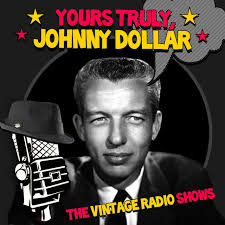
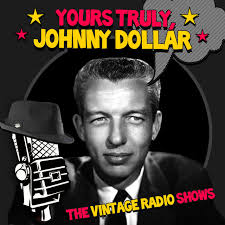

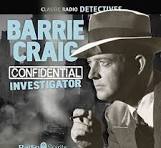
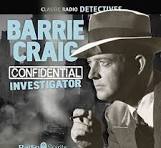
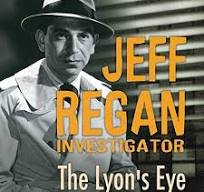
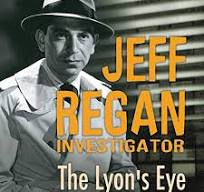
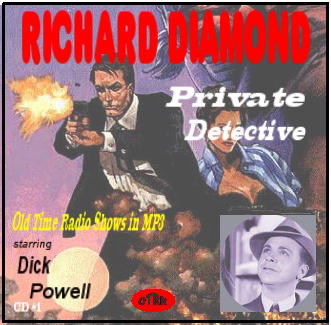
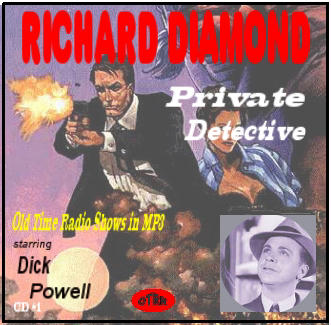
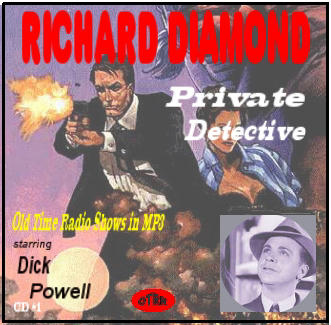
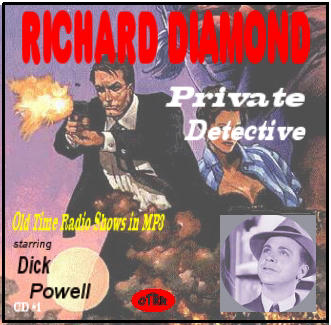
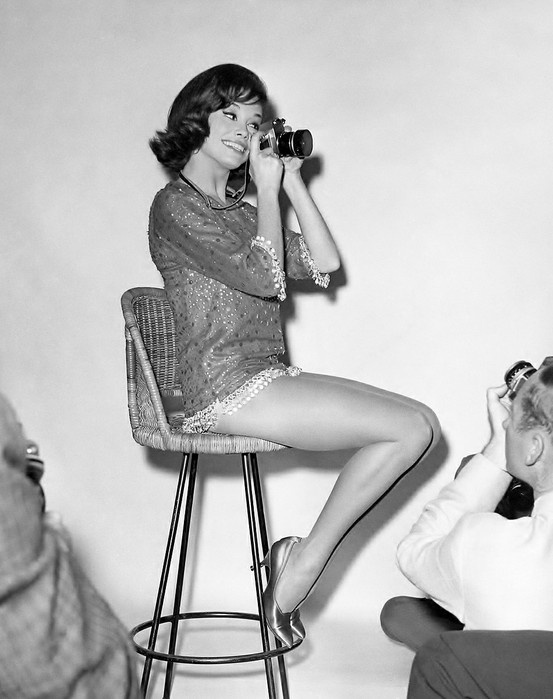



this has got the same episode twice.